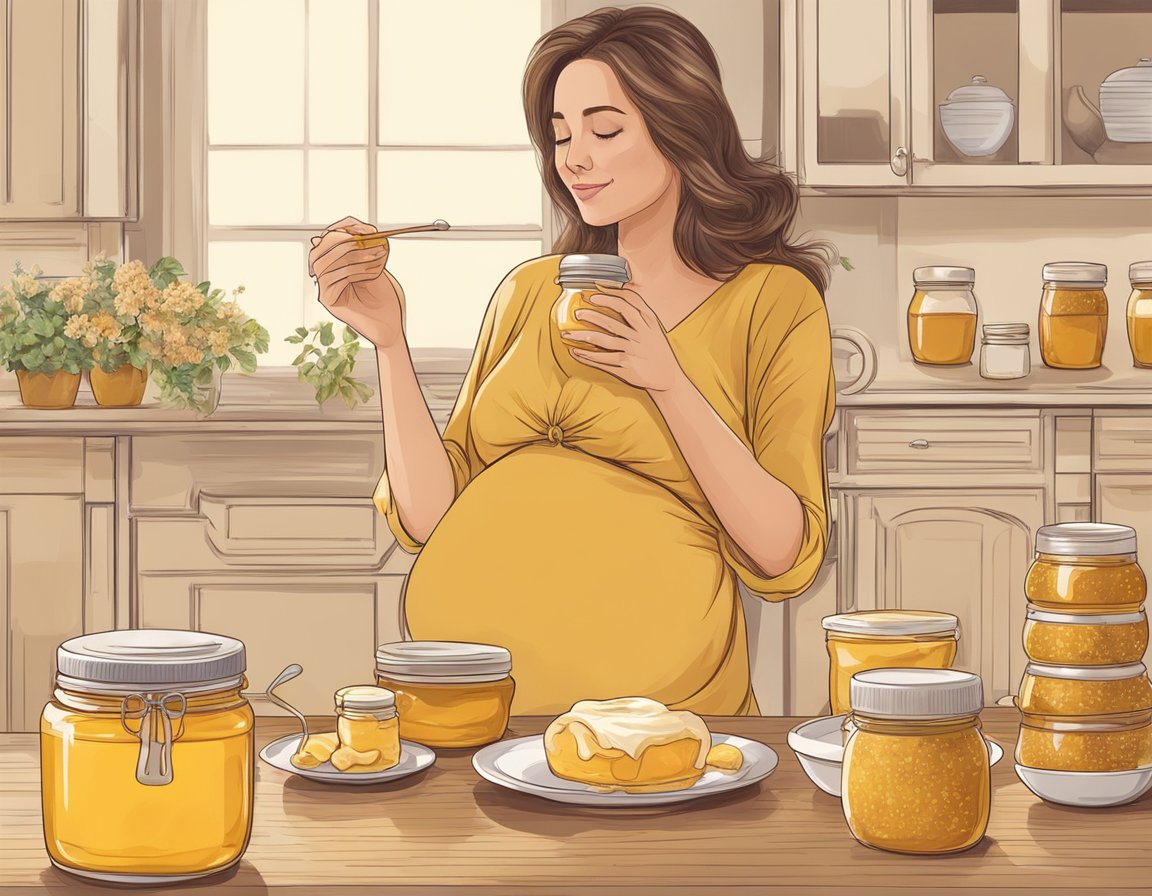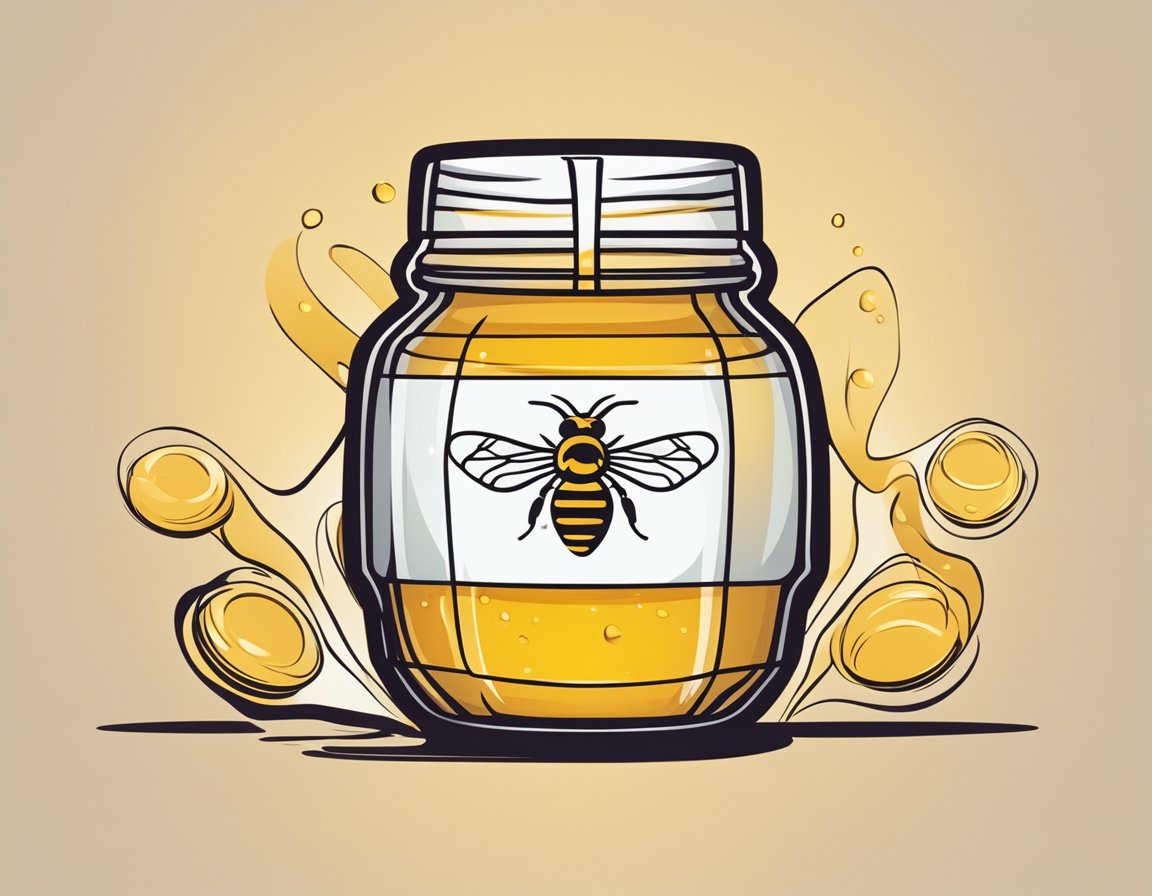Can Pregnant Women Safely Eat Honey In Pregnancy?
Are you pregnant and wondering if you can safely eat honey in pregnancy? Honey is a natural food that has been used for its medicinal properties for centuries. It contains antioxidants, antibacterial properties, and has been known to soothe sore throats and coughs. However, when it comes to consuming honey in pregnancy, there are some precautions you should take.

Honey is almost entirely made up of natural sugars and water, but it also contains small amounts of other substances such as enzymes, amino acids, and minerals. The benefits of honey are numerous, but it is important to note that honey can contain bacteria that can be harmful to pregnant women and their unborn babies. Raw honey, in particular, can contain spores of the bacteria that cause botulism, a rare but serious illness that can affect the nervous system.
Honey and Pregnancy
If you're pregnant, you may be wondering if it's safe to eat honey when pregnant? The good news is that honey is generally safe to eat during pregnancy, as long as it's consumed in moderation.
Raw honey for pregnancy is not recommended, as it may contain harmful bacteria that can be harmful to both you and your unborn child. It's best to avoid eating raw honey in pregnancy to reduce the risk of food-borne illness.
If you have gestational diabetes, you may be wondering if it's safe to eat and can you have honey while pregnant? While honey is a natural sweetener, it's still high in sugar and can cause your blood sugar levels to spike. It's best to limit your intake of honey and other sweeteners if you have gestational diabetes.
Honey is known to have antibacterial properties and may be beneficial for your health during pregnancy. However, there is limited research on the effects of honey on an unborn child. It's best to consult with your healthcare provider before consuming honey in pregnancy.
While honey does not pass through the placenta to your unborn child, it's still important to consume honey in moderation during pregnancy. Eating too much honey can lead to excess weight gain, which can increase the risk of complications during pregnancy.
In summary, it's generally safe to eat honey in pregnancy as long as it's pasteurised and consumed in moderation. It's best to avoid raw honey during pregnancy and limit your intake of honey if you have gestational diabetes. Consult with your healthcare provider if you have any concerns about consuming honey during pregnancy.
Raw Honey and Its Risks

If you are pregnant, you may be wondering can pregnant women eat raw honey during your pregnancy. Raw honey is honey that has not been pasteurised or heated, and it is often touted for its health benefits. However, it is important to understand the risks associated with consuming raw honey while pregnant.
Raw honey can carry the risk of bacteria contamination, which can cause illness called botulism. Botulism is caused by a toxin produced by a bacterium called Clostridium botulinum, which can be found in soil, water, and some foods. Infants are particularly susceptible to botulism because their digestive systems are not fully developed, and they may not have the ability to fight off the botulinum toxin.
Honey can contain botulism spores, which are not harmful to adults but can be dangerous for infants. If an infant ingests botulism spores, they can grow and produce the botulinum toxin in the baby's intestines, leading to a potentially life-threatening condition called infant botulism.
To avoid the risk of infection, it is recommended that pregnant women avoid raw honey and other raw foods, including raw fish. Instead, opt for pasteurised honey, which has been heated to kill any potential bacteria or botulism spores. Pasteurisation is a process that involves heating the honey to a specific temperature for a set period of time, which kills any bacteria or spores that may be present.
In summary, while raw honey may have health benefits, it is not recommended for pregnant women due to the risk of bacteria contamination and botulism spores. To be safe, choose pasteurized honey instead.
Honey and Breastfeeding
If you're a new mother, you may be wondering whether it's safe to eat honey while breastfeeding. The good news is that most adults and children can safely consume honey, including breastfeeding mothers. However, there are a few important things to keep in mind.
Firstly, it's important to note that infants under one year old should not be given honey. This is because their digestive system is still developing and may not be able to handle the bacteria that can be present in honey. It's recommended that you wait until your child's first birthday before introducing honey into their diet.
When it comes to your own honey intake, it's generally safe to consume honey while breastfeeding as long as it's pasteurized. The pasteurization process involves heating the honey to kill any bacteria that may be present. This makes it safe for consumption by both adults and children.
It's also important to consume honey in moderation, especially if you have a history of inflammatory bowel disease or other digestive issues. Honey has a lower glycemic index than sugar, but it can still cause a spike in blood sugar levels if consumed in large amounts.
If you're unsure about whether it's safe for you to eat honey while breastfeeding, it's always best to talk to your doctor. They can provide you with personalized advice based on your individual circumstances.
Lastly, if you have any honey that has been sitting in your pantry for a while, you may need to throw it out. Honey can crystallize over time, which can make it difficult to use. However, it's still safe to consume even if it has crystallized. Simply heat it up to return it to a liquid state.
Nutritional Value of Honey

Honey is a natural sweetener that is often used as a substitute for sugar. It is a highly nutritious food that contains a wide range of vitamins and minerals. Here are some of the nutritional benefits of honey:
- Antioxidants: Honey contains antioxidants that help to protect your body from damage caused by free radicals.
- Polyphenols: Honey is rich in polyphenols, which are natural compounds that have been shown to have anti-inflammatory and anti-cancer properties.
- Enzymes: Honey contains enzymes that help to break down food and aid in digestion.
- Lower Glycemic Index: Honey has a lower glycemic index than sugar, which means that it does not cause a rapid spike in blood sugar levels.
- Good for Pregnant Women: Honey is a safe and healthy food for pregnant women to consume in moderation.
- Honey Intake: The recommended daily intake of honey is 1 to 2 tablespoons per day.
- Honey Makes a Great Natural Sweetener: Honey is a great alternative to sugar and can be used in a variety of recipes to add sweetness and flavour.
- Honey also has Medicinal Properties: Honey has been used for centuries for its medicinal properties and can be used to treat a variety of ailments.
- Benefits of Honey for Pregnant Women: Honey can help to soothe a sore throat, ease morning sickness, and provide a natural source of energy.
- Honey is Almost Fat-Free: Honey is almost fat-free, making it a great choice for those who are watching their weight.
- Honey May Contain Trace Amounts of Bacteria: While honey is generally safe to consume, it may contain trace amounts of bacteria that can be harmful to infants under the age of one.
- Honey Contains Natural Sugars: Honey contains natural sugars, which can provide a quick source of energy without causing a rapid spike in blood sugar levels.
Frequently Asked Questions
Q: Can pregnant women safely eat honey in pregnancy?
A: Yes, pregnant women can safely eat honey in pregnancy.
Q: Is it safe to eat raw honey during pregnancy?
A: It is generally recommended to avoid eating raw honey during pregnancy.
Q: Is honey safe to eat in pregnancy?
A: Yes, honey is safe to eat in pregnancy.
Q: What is pasteurised honey?
A: Pasteurised honey refers to honey that has been heated to a certain temperature to kill any potential bacteria or pathogens.
Q: Is unpasteurized honey safe to eat during pregnancy?
A: It is generally recommended to avoid unpasteurised honey. Pregnancy can be a time when you need to take special care on what you eat. If in any doubt at all, you should consult a medical professional.
Q: Is raw honey safe during pregnancy?
A: It is generally recommended to avoid eating raw honey during pregnancy.
Q: How much honey can pregnant women safely eat?
A: There is no specific limit on how much honey pregnant women can safely eat, but it is recommended to consume it in moderation.
Q: Can pregnant women eat honey in the last 3 months of pregnancy?
A: Yes, pregnant women can eat honey in the last 3 months of pregnancy.
Q: Can pregnant women with gestational diabetes eat honey?
A: It is recommended for pregnant women with gestational diabetes to consult with their healthcare provider before consuming honey.
Q: Is honey safe for infants under one year of age?
A: It is not recommended to give honey to infants under one year of age due to the risk of infant botulism.